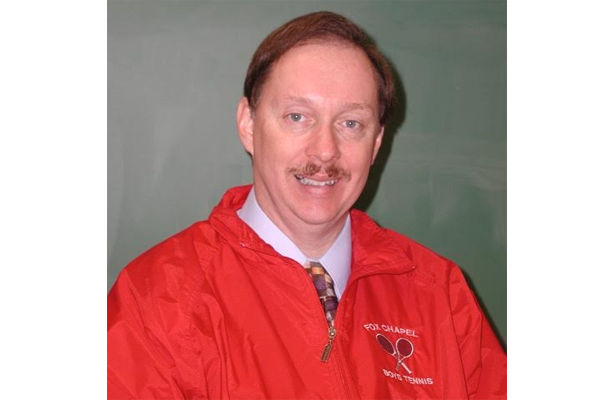When Dave Prevost retired from teaching in 2013 after nearly 40 years in the profession, he knew one thing for certain – he definitely was not ready to spend all of his new-found extra time watching television, reading, and puttering around the house.
But when he had a chance to craft a new routine for himself, Mr. Prevost found he didn’t need to look very far. He went back to his old stomping grounds at Fox Chapel Area High School and agreed to go back to coaching in 2016, this time as the part-time coach of the girls’ junior varsity tennis team. He previously had retired from coaching in 2015 after heading both the boys’ and girls’ teams for 19 years and then solely the boys, for a total of 35 years. He also held onto his position as faculty manager for the athletic department, something he’d done for the past 18 years.
His title, “faculty manager,” may be somewhat misleading though, because Mr. Prevost has nothing to do with overseeing the district’s staff. He does, however, have everything to do with important behind-the- scenes tasks that ensure the smooth operation of most of the high school’s home and away athletic competitions. It’s a role that might not elicit much grandeur, but his contributions are indispensable, especially to Director of Athletics Mike O’Brien.
“Few people understand the amount of detail that goes into planning and executing a sporting event,” Mr. O’Brien says of his right-hand man. “Dave works really hard to make sure everything runs smoothly and that there are no surprises on game day. He’s a person I know I can always count on to chip in and do anything that needs to be done. He’s also just a great guy and I’m really thankful he decided to stay with us after he retired from teaching.”
“There now are so many sports at the high school that it’s impossible for the athletic director to do everything himself, especially since so many of them happen simultaneously,” says the former educator. “I help out by taking charge of things like ticket sales, bus transportation, working with officials, making sure the set-up on the field or courts is right and then making adjustments to fields if necessary, and generally just supervising the operation of events.”
He also has the task of quieting down fans who become a little too exuberant, making sure the press box and/or scoring stations are set up properly, getting the band into the facility and settled, and even checking the locker rooms to make sure everything the players may need is there. It’s a job comprised of what seems like a thousand tasks and, in his early years on the job, required a lengthy handwritten check list.
These days, the faculty manager maintains a methodical but mental to-do list, and is prepared for most any surprise that might arise during the live events.
“I remember working the very first evening game in our new gym,” says Mr. Prevost. “During the game, the lights went out so I went into the utility room where the circuit panels are located to reset them. Nothing had been labeled yet, so I had to go through quite a few before I found the right circuit breaker.”
He continues, “Another time I had to help out looking for a kid’s tooth after he got elbowed during a basketball game – we found it! More typically, we’re looking for contacts, but we usually don’t find them.”
But there also have been more serious occasions when Mr. Prevost’s quick-thinking was critical. “We’ve had people suffer from medical emergencies, kids have broken their noses, and one time I even had to immobilize a player’s arm after she broke it during a tennis match,” he recalls. “It was one of the visiting players and this was before the days when we had trainers on-site.”
What the former social studies teacher likes best about what he does quietly, however, is being able to mingle with the crowds and talk with some of his former students and athletes, some of whom now have children of their own at the high school.
“I loved working for Fox Chapel Area and what I’m doing still keeps me connected,” he says of his decision to remain a part of the sports program. “I’ll do anything that’s needed; just don’t ask me to run the swimming scoreboard. That’s something I hope I never have to do again! I can handle the clock, but there are so many facts and figures on it. There’s no way I can handle the ‘Christmas tree!’”

